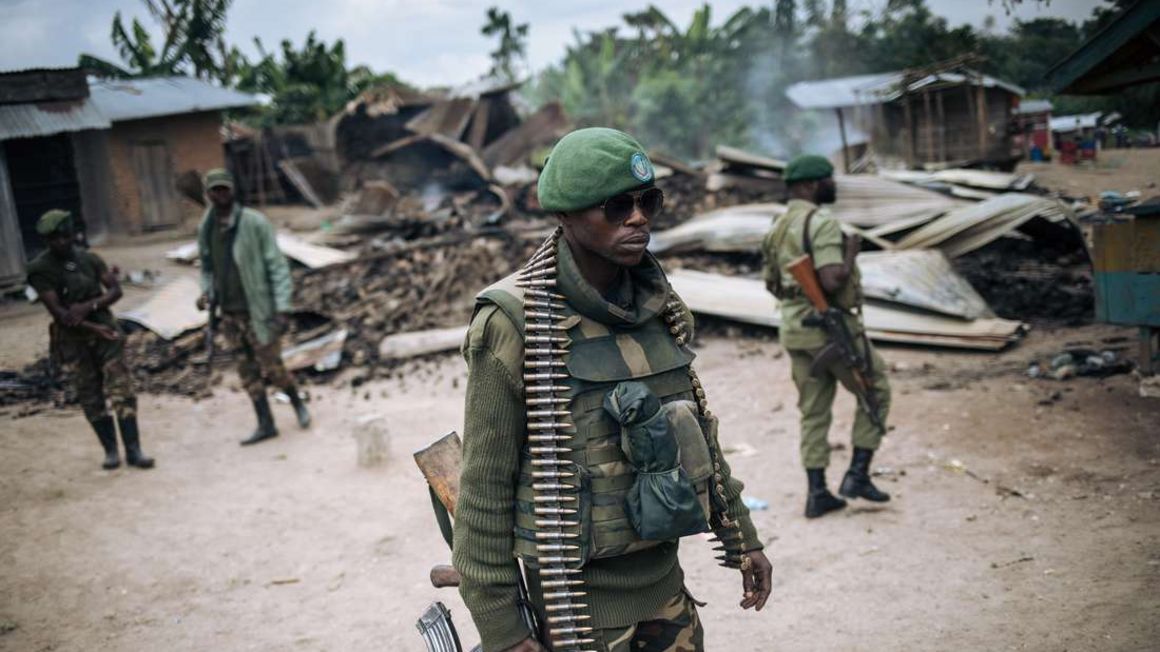Why eastern DRC is a hotbed of armed conflicts
Thursday December 02 2021

Soldier patrol Manzalaho near Beni on February 18, 2020 following an attack by members of the rebel group ADF. PHOTO | AFP
Eastern Democratic Republic of Congo (DRC) is one part of the country that has endured protracted conflicts orchestrated by various rebel groups which include the Allied Democratic Forces (ADF), the March 23 Movement (M23), the alliance of Patriots for a free and sovereign Congo, the Armed Forces of the Congolese People and the Democratic Forces for the Liberation of Rwanda.
Other groups include The man Man, Rai Mutomboki, Local Defense Forces Busumba (LDF) and the Front for Patriotic Resistance in Ituri. Ituri is a gold-rich region.
Experts say that these groups survive mainly on looting and smuggling among other sources of funding.
Dr Ashad Ssentongo explains why there are many rebel groups in this region which is vastly forested with hilly terrain.
“The place is rich with minerals. And therefore, that makes it a preference for anybody. The region is so ethnically inter-connected to make the transnational organization and mobilization of disgruntled groups very favourable,” Dr Ssentongo says
The expert in conflicts and international relations argues that greed is a huge problem.
“The greedy people are the ones that lead the insurgent groups. It is not necessarily genuine grievances but more about the desire to get to power and control resources,” Dr Ssentongo told NTV Uganda.
Also, the history of the 12 member states in the Great Lakes region characterized by conflict has a bearing on the state of affairs of the region.
“Resources have been diverted to fighting and therefore no development can sustainably take place. As they pick up, a war breaks out and you lose that momentum. But also, the internalization of the thinking that when conditions are unfavourable we fight,” Dr Ssentongo says.
Other scholars shared their views on why the region is home to numerous armed groups.
“The government of the DRC, in Kinshasa, is very far from the Eastern region. The governments in Congo, right from the time of Zaire, have been weak. If the government cannot control its territorial integrity then other groups can come and take it. Even Uganda, if we did not have the capacity to control the entire territory, any group can come and take advantage,” International Relations expert Prof Solomon Asiimwe told NTV Uganda.
With heightened insecurity in the region, scholars have questioned the purpose of MONUSCO forces. Thousands of people have been killed by the rebels and scores of women have been raped and yet no one has been held accountable. In 2017, rebels killed 15 peacekeepers in the DRC, some of whom were Tanzanians.
MONUSCO, the United Nations Organization Stabilization Mission in the Democratic Republic of the Congo, is mandated to provide support to the Congolese army forces to carry out targeted offensive operations through the force intervention brigade. However, the mission does not have the mandate to support the Uganda armed forces, UPDF. It is for this reason that when the DRC government was discussing joint military operations with neighbouring countries in 2019, there was confusion as to what this meant for MONUSCO.
“We need to win the minds of those who are fighting. A lot of these are Ugandans why. Have either been misled, radicalized. I suggest that government can also use other means of negotiations and =change the minds of the misled,” Prof Asiimwe says.
“The role of the state is central. I think states in the region need to realize that it is a common problem affecting the region and deal with it. There is always a communal content in protracted conflicts that tend to go on in cycles and cycles,” Dr Ssentongo says.
In a statement on Twitter MONUSCO asks,” Does the entry of Ugandan forces into DRC change anything for MONUSCO?” It adds, “Is it true that there are going to be operational consequences that we have to take into account in what we can do.”
“Our mandate authorizes us to support the Congolese army in its operations. Our mandate does not allow us to support a regional coalition,” the statement reads.
The people behind the formation of the forum of parliaments of the international conference on the Great Lakes region made this kind of body so that it can sort out problems like those of the protracted conflicts within the eastern region of the DRC. Scholars say that the major problem within that region is greed which supersedes grievance.


